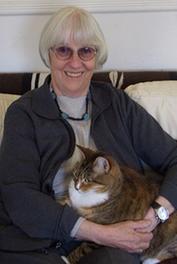 |
|
| Marijane Meaker | |
Marijane Meaker, "a versatile and prolific author whose 1952 novel, Spring Fire, was among the first lesbian-themed paperback originals and sold so briskly that it jump-started the genre of lesbian pulp fiction," died November 21, the New York Times reported. She was 95.
Meaker, who wrote dozens of books in multiple genres under several pen names, told NPR in 2003: "I like pseudonyms. I like disguises. I've always hated the name Marijane. And I think the idea that you can name yourself is interesting." Another reason for the strategy was that when she arrived in New York she couldn't get an agent, and so she became one, with a roster of clients that consisted of her pseudonymous selves. "All of my clients were me," she recalled. "And I would take people out to lunch and tell them about my clients. And nobody knew that I was all my clients."
As M.E. Kerr, she wrote YA novels and was regarded as "a pioneer in realistic fiction for teenagers," as the Young Adult Library Services Association said in presenting her with its Margaret A. Edwards Award in 1993. As Ann Aldrich, she wrote nonfiction books that chronicled lesbian life in Greenwich Village and beyond, including We Walk Alone (1955) and We, Too, Must Love (1958). As Mary James, she wrote quirky books aimed at younger children, like Shoebag (1990).
Her books under her own name included Highsmith: A Romance of the 1950s (2003), about her two-year relationship with the author Patricia Highsmith. She was one of three main interviewees for the recent documentary film Loving Highsmith," the Guardian noted, "and on the promotional tour she belied her 93 years with spirited and telling reminiscences."
"But the work that put her on the map and may have had as much impact as any of the others was Spring Fire, published by Gold Medal Books under the name Vin Packer, which Ms. Meaker later used for a series of suspense novels," the Times wrote. The book, which is said to have sold 1.5 million copies, was about a college freshman who falls in love with one of her sorority sisters and "spoke to a significant segment of women who, in the early 1950s, were not seeing themselves in fiction."
Among the writers who followed Meaker into the new world was Ann Bannon, whose books include Odd Girl Out (1957), I Am a Woman (1959) and several others the series known as the Beebo Brinker Chronicles. Noting that Spring Fire was a ground-breaker, Bannon said, "Meaker had in fact founded a new genre, lesbian pulp fiction, which was to become for a stretch of about 15 years wildly successful, and a moneymaker. It was finding fans among both sexes, and coast to coast, pushing same-sex romance into conversational orbit for the first time in history."
Meaker was uncomfortable with the ending of Spring Fire. The Times noted that the Postal Service then "was on the lookout for anything that seemed to glorify what its censors thought of as perversion. So publishers made sure she and other lesbian writers gave their stories unhappy endings."
"Which," said Robin Talley, a queer author of YA books, "is why in Spring Fire, one of the women in the central romance winds up in an asylum and the other becomes straight and forgets she ever liked girls to begin with.... Still, Spring Fire and the novels it influenced were what caused a whole generation of queer women to see themselves represented for the first time."
In 1974, Meaker told the New York Times she was drawn to the YA genre by the conviction that teenagers were "entitled to honest, up-to-date good stories with characters their own age to relate to--books that are about them and what bothers them, not about their parents.... This is the age when kids are going through great emotional upheavals. And they are looking for truths. But until young adult novels started growing up, five years ago or so, they couldn't find books about themselves, about their feelings, their problems."

